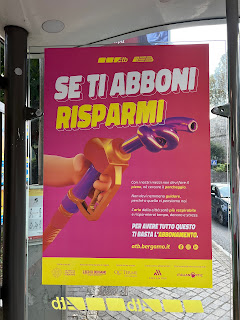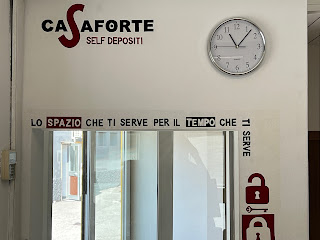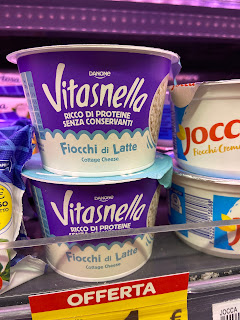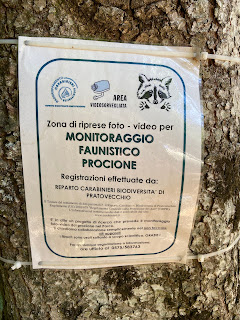previous lesson | this lesson | next lesson
In this installment of Street Sign Language Lesson, we have scapes, (no) subjunctive, self-storage, gender asterisking, shaving with grandpa, hemorrhoids, and raccoons. Enjoy.

Giant garlic stalks from Val di Chiana
In English, a scape is a long stalk coming directly from the root as typical of the stalk of plants in the onion genus like this one, Allium ampeloprasum var Holmense. In English, we call it elephant garlic and it’s known for it’s sweet more delicate flavor as compared to its smaller cousins. This large garlic (aglio + ione) is most associated with the Val di Chiana in Tuscany. Allium ampeloprasum is differentiated into five cultivated vegetables: leek, elephant garlic, pearl onion, kurrat, and Persian leek.
Need a good recipe, see the dish Pici all’Aglione.

Se ti abboni risparmi
If you sign up, you save (gas)
As Italian language learners, we are so conditioned to look for subjunctive when we see “se” (“if”) - hypothetical. So, when I saw this phrase, I was trying to work out where the subjunctive was. Then I realized, it’s just present tense because if you sign up (for a bus pass) you’ll definitely save (gas). I was looking for something that wasn’t there.
You could imagine a version of this publicity with the subjunctive (Se ti abbonassi risparmieresti), a mouthful and too uncertain as to whether there would be savings - translated as "if you subscribe, you would save". You could also say this using future tense (Se ti abbonerai risparmierai), but that sounds like a mouth full and doesn't convince the reader as much being trasnlated as "if you subscribe, you'll save".

Liberi/e tutt*
Free everyone and everything?
One way of dealing with gender (or really ignoring it) is to use an asterisk (asterisco) where there would be letters indicating gender. The graffiti in this photo shows that but the writer seems to only have done that half-way through. Why not liber* tutt*? For more information, see THE ASTERISK FOR GENDER NEUTRALITY. There is no spoken form of the asterisk; you can only use it in writing.

Liberi/e tutt*
Free everyone and everything?
One way of dealing with gender (or really ignoring it) is to use an asterisk (asterisco) where there would be letters indicating gender. The graffiti in this photo shows that but the writer seems to only have done that half-way through. Why not liber* tutt*? For more information, see THE ASTERISK FOR GENDER NEUTRALITY. There is no spoken form of the asterisk; you can only use it in writing.

Lo spazio che ti serve per il tempo che ti serve
The space you need for the time you need.
We just emptied our storage in the States and now here we are renting storage in Italy. I give up. Well, at least there’s a language lesson in it as in this simple phrase seen at Casaforte. Self-storage is taking off in Italy and we are helping it grow. Sigh….it’s only for 2 months.

Fiocchi di latte
Cottage cheese
Literally, “flakes of milk”. According to Wikipedia: The term cottage cheese first began to be used for such simple homemade cheese in America in the mid-19th century.

Pennello da barba
Shaving brush
I recently purchased and started using Proraso. The consistency and smell of it reminds me of my grandfather. I remember as a kid watching him shave, using the shaving brush to spread the shaving cream around on his face. I was fascinated by that pennello da barba, which literally means “brush for the beard”.

Cosa c’è dietro il dolore e il prurito? Potrebbe trattarsi di emorroidi.
What’s behind that pain and itching? It could be hemorrhoids.
This sign interested me because the word for itch is prurito and it’s not a word that easily sticks in my head. For the missing "H" on hemorrhoids, see our blog post Italian: The Case of the Missing H in the Italian and English Word Cognates.

Zona di riprese foto – video per monitoraggio faunistico procione
Surveillance area – video for the control of raccoons.
The interesting part of this sign is the word procione meaning “racoon” - Procyon lotor. And what’s interesting is that this sign was seen near the Hermitage of Camaldoli, north of Arezzo. Why? Because the racoon is native to North America. But due to escapes and deliberate introductions of racoons in the 20th century, they now are in Germany, France, Italy, and Spain. Racoons are also known in Italian more commonly as orsetto lavatore – “little bear that washes”. I remember learning this word in the book Io non ho paura.
No comments:
Post a Comment
All comments are moderated. If your comment doesn't appear right away, it was likely accepted. Check back in a day if you asked a question.